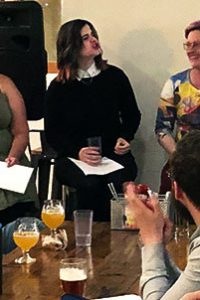ICon 2020 Online Report

The theme for ICon is usually announced around April, and that’s when the work on the festival kicks into high gear. For a while we held on to the hope that ICon could be held in the usual manner, in person. Around July, it became clear this wouldn’t happen, and the team running it faced a difficult choice. Aptly, “choices” was the theme of the festival this year. What they came up with was most impressive – by the beginning of October they had a dedicated site that ran three “lecture halls,” a virtual “meeting room” where the events of individual fandoms could be held, a few gaming rooms, an online fan chat, and even a virtual dealers room with online stores. Expectedly, there were some technical difficulties, but most of them were solved within the first couple of hours. What you always have to bear in mind, though, is that the technical aspect in speakers’ houses is not as robust and difficulties are expected.

This format also allowed something that people wanted for a while – buying a membership rather than tickets for individual events. Usually admission to the venue where ICon is held is free and people can walk around among the dealers’ stalls and enjoy the atmosphere, but tickets have to be bought to each event. This year, with all the events broadcast on the same site, one pass provided access to all of the content and members could sample a panel or a lecture, and leave it and go to another one. The one exception was gaming events, where the number of players is naturally limited and these required registration ahead of time.
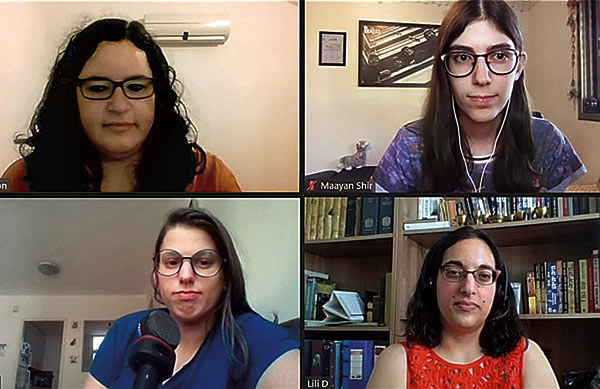
A nice feature that the team added was a chat on each lecture hall webpage, unseen to the speakers, where the audience could interact. It was the equivalent of the constant murmuring you hear at in-person events, without actually disturbing the speaker or other people in the audience. This feature, noted Ronie Krupnik, head of programming, is one of the things that helped make the virtual ICon a little more like an “actual” ICon. In the online con, she said, “we are losing anything which is not content – the atmosphere, the colorful carnival, the cosplay. We did what we could to preserve this atmosphere… and the audience did a lot of the work for us.” Fans, for example, started a “let’s pretend we’re at ICon” Facebook group.
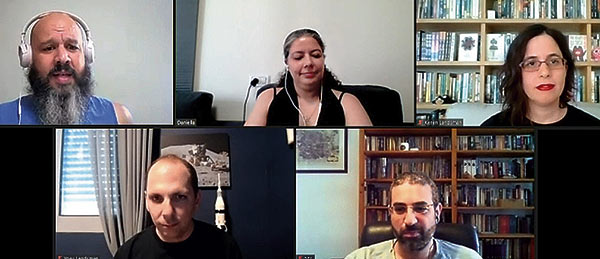
I asked her about the way this new format affects programming. “We had the very frustrating task of cutting all the most unique events, and we had some great ones lined up,” like a “roving” lecture, a couple of stage original productions, and other surprises they had in store for visitors. In some ways, this format allowed the programming team more freedom. Usually, Krupnik said, she tries not to schedule too many events of the same fandom one after another, to allow the audience time to rest. But “when we’re at home, people can get something to eat, take a break.” The online format also meant events could go until later in the day, since people didn’t have to make the last bus home, and the peak hours were different. ICon this year also stretched over four days rather than the usual three. In addition, live events were held on Facebook in the days leading to ICon and in the days following it, contributing to the sense of community.
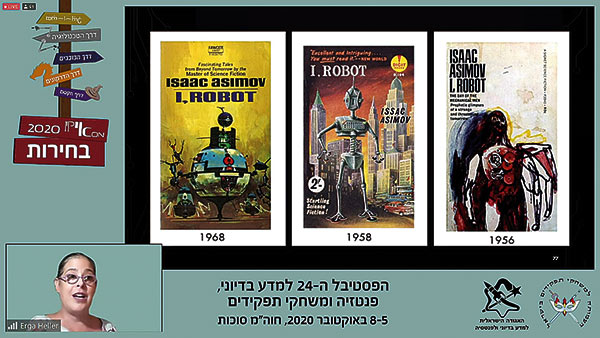
There were some 160 events this year (including two original LARPs written specifically to be played online), compared to around 400 last year. Around 900 passes granting access to the ICon site were bought. As far as content, the gaming side of ICon probably suffered the most. In a normal year we sometimes have up to ten games running simultaneously in different rooms, and a tent for board games. This is impossible in an online format. But what this format does allow is more overseas guests. Kelly Link and Daryl Gregory talked about genre and mainstream and crossing the barriers between them, and about writing in an age of pandemic and social distancing. Stephanie Burgis talked with the Israeli translator and editor Nadav Almog about YA literature and its special character and place. This year’s theme, “choices” lent itself to a lot of discussions about creative choices, but also about how fans choose their content and create their own content. There were a few interesting panels that dealt with fanfiction. Another meaning of the Hebrew word for choices is “elections,” so a group of panels and lectures covered issues from the rarity of democratic regimes in fantasy to the future of elections as imagined in science fiction.

From a speaker’s perspective, I’ve been speaking and moderating in cons in Israel since 2003 and at some cons abroad, and this was the weirdest speaking experience ever. The way it was set up was so the speakers did not see the audience, and while in panels you interact with the other panelists, when I gave my lecture it was just me and the computer. There was a text box where the audience could write questions, but I couldn’t see them and the producer read the questions to me at the end of the talk. Strange as hell.
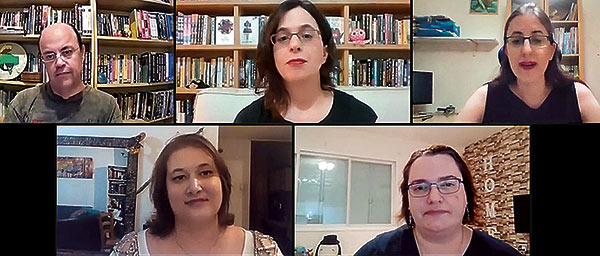
Tomer Shalev, who’s been managing ICon for the past ten years, talked a bit in an interview for the Israeli society for SF&F about ICon over the years. “I live for feedback,” he said, it gives him a chance to learn and improve from year to year, gives the audience a better experience. “A good example is the issue of accessibility which has come a long way in the last few years.” ICon has the benefit of a large cadre of people that have stayed with the production team for quite a few years, which gives it a solid base to grow and develop from year to year.
Talking about this year’s ICon, he speaks highly about the IT team that had about six weeks to come up with solutions for new user management system, convert old systems to the new needs, and build a brand new broadcasting site. “Another impressive thing was that just about any speaker from previous years we approached said ‘yes’ even though it was much harder to sit in front of a camera rather than stand in front of an audience.”
When asked what he’d like to take forward from this year’s online ICon for coming years, he talked about using the platform in years to come to make the content accessible for people who can’t attend in person, and in the nearer future using it for other cons in Israel until we can hold cons in real life. All the broadcasted events were also recorded, which means much better documentation compared to previous years. All the recorded content will be available online for members who bought a pass for the next six months, and afterwards it will be made accessible to everyone for free. All things considered, ICon seems to have made some very good choices this year.
–Ehud Maimon
This report and more like it in the November 2020 issue of Locus.
 While you are here, please take a moment to support Locus with a one-time or recurring donation. We rely on reader donations to keep the magazine and site going, and would like to keep the site paywall free, but WE NEED YOUR FINANCIAL SUPPORT to continue quality coverage of the science fiction and fantasy field.
While you are here, please take a moment to support Locus with a one-time or recurring donation. We rely on reader donations to keep the magazine and site going, and would like to keep the site paywall free, but WE NEED YOUR FINANCIAL SUPPORT to continue quality coverage of the science fiction and fantasy field.
©Locus Magazine. Copyrighted material may not be republished without permission of LSFF.




